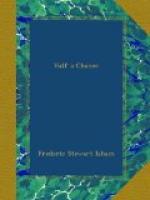Sir Charles turned. “Steele was differing from me about a good, old, honest English sport.”
“Sport?” Lord Ronsdale dropped into a chair and helped himself to whisky and soda conveniently near.
“I refer to the ring—its traditions—its chronicles—”
“Ah!” The speaker raised his glass and looked at John Steele. The latter was nonchalantly regarding the pages of a book he yet held; his face was half-turned from the nobleman. The clear-cut, bold profile, the easy, assured carriage, so suggestive of strength, seemed to attract, to compel Lord Ronsdale’s attention.
“For my part,” went on Sir Charles in a somewhat disappointed tone, “I am one who views with regret the decadence of a great national pastime.”
He regarded Ronsdale; the latter set down his glass untasted. “My own opinion,” he said crisply; then his face changed; he looked toward the door.
“Well, it’s over!” the light tones of Jocelyn Wray interrupted; the girl stood on the threshold, glancing gaily from one to the other. “Did you tell my uncle, Mr. Steele, what you thought of his purchase? I see, while on his favorite subject, he has forgotten to offer you a cigar.”
Sir Charles hastened to repair his remissness.
“But how,” she went on, “did it go? The program, I mean. Have you forgiven me yet for asking you to come, Mr. Steele?”
“Forgiven?” he repeated. Lord Ronsdale’s eyes narrowed on them.
“Confess,” she continued, sinking to the arm of a great chair, “you had your misgivings?”
He regarded the supple, slender figure, so airily poised. As she bent forward, he noticed in her hair several flowers shaped like primroses, but light crimson in hue. “What misgivings was it possible to have?” he replied.
“Oh,” she replied, “the usual masculine ones! Misgivings, for example, about stepping out of the routine. Routine that makes slaves of men!” with an accent slightly mocking. “And stepping into what? Society! The bugbear of so many men! Poor Society! What flings it has to endure! By the way, did your convict get off?”
“Get off? What—”
“The one you represented—is that the word?—when we were in court.”
“Yes; he was acquitted.”
“I am glad; somehow you made me feel he was innocent.”
“I believed in him,” said John Steele.
“And yet the evidence was very strong against him! If some one else had appeared for him—Do you think many innocent people have been—hanged, or sent out of the country, Mr. Steele?” Her eyes looked brighter, her face more earnest now.
“Evidence can play odd caprices.”
“Still, your average English juryman is to be depended on!” put in Lord Ronsdale quickly.
“Do you think so?” An instant Steele’s eyes rested on the speaker. “No doubt you are right.” A sardonic flash seemed to play on the nobleman. “At all events you voice the accepted belief.”




